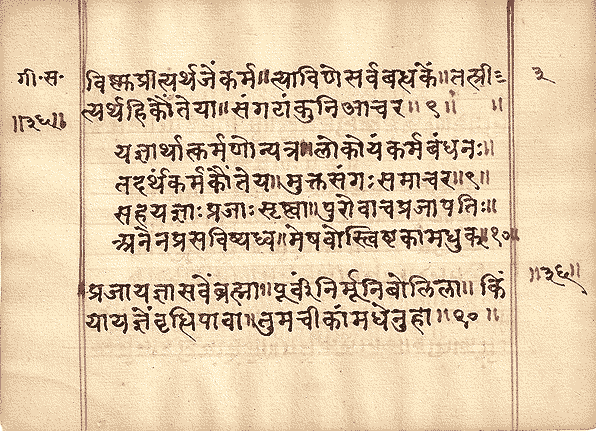BhG 3.9
yajñārthāt karmaṇo ‘nyatra loko ‘yaṃ karma-bandhanaḥ
tad-arthaṃ karma kaunteya mukta-saṅgaḥ samācara
To play the media you will need to either update your browser to a recent version or update your Flash plugin.
syntax
he kaunteya (O son of Kuntī),
yajñārthāt (than that whose object is sacrifice) karmaṇaḥ (than activity) anyatra (except),
ayaṁ lokaḥ (this world) karma-bandhanaḥ (bound by work) [asti] (it is),
[tasmāt] (therefore) tad-arthaṁ (for the sake of that) mukta-saṅgaḥ (free form attachment) karma (activity) samācara (perform).
grammar
| yajñārthāt | – | yajña-artha 5n.1 n.; BV: yasya yajñasyārthaḥ asti tasmāt – than that whose object is sacrifice / than that which is done for the sake of Viṣṇu (from: √yaj – to consecrate, to sacrifice, to worship, yajña – sacrifice, worship, name of Viṣṇu; √arth – to strive to obtain, to desire, to request, artha – purpose, advantage, concern, object, wealth, use, with the meaning ‘for the sake’ requires genitive – whose?); |
| karmaṇaḥ | – | karman 5n.1 n. – than activity (from: √kṛ – to do); |
| anyatra | – | av. – elsewhere, otherwise; |
| lokaḥ | – | loka 1n.1 m. – world; |
| ayam | – | idam sn. 1n.1 m. – this; |
| karma-bandhanaḥ | – | karma-bandhana 1n.1 m.; BV: yasya karmaṇo bandhanam asti saḥ – which is bound by work (from: √kṛ – to do, karman – activity and its result; √bandh – to bind, to fetter, bandhana – bondage, bonds, prison); |
| tad-artham | – | av. – tasyārtham – for the sake of that (from: tat – that; √arth – to strive to obtain, to desire, to request, artha – purpose, advantage, concern, object, wealth, use, suffix: for the sake of, on account of); |
| karma | – | karman 1n.1 n. – activity (from: √kṛ – to do); |
| kaunteya | – | kaunteya 8n.1 m. – O son of Kuntī (from: kunti – the people of Kunti, kuntī – Kuntī, mother of the sons of Pāṇḍu); |
| mukta-saṅgaḥ | – | mukta-saṅga 1n.1m.; BV: yena saṅgo mukto ‘sti saḥ – whose attachment is gone (from: √muc – to liberate, to release, PP mukta – liberated, gone; sam-√gam – come together or √sañj – to attach, to stick, to embrace, saṅga – clinging, contact, relation, desire, attachment); |
| samācara | – | sam-ā-√car (to behave, to perform) Imperat. P 2v.1 – perform; |
Śāṃkara
The key:
an excerpt from the commented verse
quotes from the scriptures
starting polemic
|
It is also wrong to suppose that actions lead to bondage and that they should not therefore be performed. – Why ? |
yac ca manyase bandhārthatvāt karma na kartavyam iti tad apy asat | kathaṃ? | |
|
Except in the case of action for Sacrifice’s sake, this world is action-bound. |
yajñārthāt karmaṇo ’nyatra loko ’yaṃ karma-bandhanaḥ | tad arthaṃ karma kaunteya muktasaṅgaḥ samācara ||3.9|| |
|
|
Sacrifice (Yajña) here means Īśvara, the Supreme Lord. So, the śruti says “Yajña, verily, is Vishṇu.” ‘This world’ means those persons who, as qualified for action only, are bound to do it and who accordingly perform it. |
yajño vai viṣṇuḥ (Taitirīya saṁhitā 1.7.4)iti śruter yajña īśvaraḥ | tad-arthaṃ yat kriyate tat yajñārthaṃ karma | tasmāt karmaṇo ’nyatrānyena karmaṇā loko ’yam adhikṛtaḥ karma-kṛt karma-bandhanaḥ karma bandhanaṃ yasya so ’yaṃ karma-bandhano lokaḥ, na tu yajñārthāt | | |
|
The world is not bound by action done for the Lord’s sake. Perform action without attachment. |
atas tad-arthaṃ yajñārthaṃ karma kaunteya, mukta-saṅgaḥ karma-phala-saṅga-varjitaḥ san samācāra nirvartaya ||3.9|| |
Rāmānuja
evaṃ tarhi dravyārjanādeḥ karmaṇo ‚haṅkāramamakārādisarvendriyavyakulatāgarbhatvenāsya puruṣasya karmavāsanayā bandhanaṃ bhaviṣyatīty atrāha
yajñādiśāstrīyakarmaśeṣabhūtād dravyārjanādeḥ karmaṇo ‚nyatra ātmīyaprayojanaśeṣabhūte karmaṇi kriyamāṇe ayaṃ lokaḥ karmabandhano bhavati / atas tvaṃ yajñārthaṃ dravyārjanādikaṃ karma samācara / tatrātmaprayojanasādhanatayā yaḥ saṅgaḥ tasmāt saṅgān muktas tam samācara / evaṃ muktasaṅgena yajñādyarthatayā karmaṇi kriyamāṇe yajñādibhiḥ karmabhir ārādhitaḥ paramapuruṣo ‚syānādikālapravṛttakarmavāsanām ucchidya avyākulātmāvalokanaṃ dadātītyarthaḥ
Śrīdhara
sāṅkhyās tu sarvam api karma-bandhaktavān na kāryam ity āhuḥ | tannirākurvann āha yajñārthād iti | yajño ‚tra viṣṇuḥ | yajño vai viṣṇur iti śruteḥ | tad-ārādhanārthāt karmaṇo |nyatra tad ekaṃ loko ‚yaṃ karma-bandhanaḥ karmabhir vadhyate | na tu īśvarārādhanārthena karmaṇā | atas tad-arthaṃ viṣṇu-prīty-arthaṃ mukta-saṅgo niṣkāmaḥ san karma samyag ācara
Madhusūdana
karmaṇā badhyate jantuḥ [Mbh 12.241.7] iti smṛteḥ sarvaṃ karma bandhātmakatvān mumukṣuṇā na kartavyam iti matvā tasyottaram āha
yajñārthād iti | yajñaḥ parameśvaraḥ yajño vai viṣṇur [TaittS 1.7.4] iti śruteḥ | tad-ārādhanārthaṃ yat kriyate karma tad-yajñārthaṃ tasmāt karmaṇo ‚nyatra karmaṇi pravṛtto ‚yaṃ lokaḥ karmādhikārī karma-bandhanaḥ karmaṇā badhyate na tv īśvarārādhnārthena | atas tad-arthaṃ yajñārthaṃ karma he kaunteya ! tvaṃ karmaṇy adhikṛto mukta-saṅgaḥ san samācara samyak-śraddhādi-puraḥsaram ācara
Viśvanātha
nanu tarhi karmaṇā badhyate jantuḥ iti smṛteḥ | karmaṇi kṛte bandhaḥ syād iti cen na | parameśvarārpitaṃ karma na bandhakam ity āha yajñārthād iti | viṣṇv-arpito niṣkāmo dharma eva yajña ucyate | yad-arthaṃ yat karma tato ‚nyatraivāyaṃ lokaḥ karma-bandhanaḥ karmaṇā badhyamāno bhavati | tasmāt tvaṃ tad-arthaṃ tādṛśa-dharma-siddhy-arthaṃ karma samācara |
nanu viṣṇv-arpito ‚pi dharmaḥ kāmanām uddiśya kṛtaś ced bandhako bhavaty evety āha mukta-saṅgaḥ phalākāṅkṣā-rahitaḥ | evam evoddhavaṃ praty api śrī-bhagavatoktam –
sva-dharma-stho yajan yajñair
anāśīḥ-kāma uddhava |
na yāti svarga-narakau
yady anyan na samācaret ||
asmin loke vartamānaḥ
sva-dharma-stho ‚naghaḥ śuciḥ |
jñānaṃ viśuddham āpnoti
mad-bhaktiṃ vā yadṛcchayā || [BhP 11.20.10-1] iti
Baladeva
nanu karmaṇi kṛte bandho bhavet | karmaṇā badhyate jantur ity ādi-smaraṇāc ceti tatrāha yajñārthād iti | yajñaḥ parameśvaraḥ yajño vai viṣṇur iti śruteḥ | tad-arthāt tat-toṣa-phalāt karmaṇo ‚nyatra svasukha-phalaka-karmaṇi kriyamāṇe ‚yaṃ lokaḥ prāṇī karma-bandhanaḥ karmaṇā badhyate | tasmāt tad-arthaṃ viṣṇu-toṣārthaṃ karma samācara | he kaunteya mukta-saṅgas tyakta-sukhābhilāṣaḥ san nyāyopārjita-dravya-siddhena yajñādinā viṣṇur ārādhya tac-cheṣeṇa deha-yātrāṃ kurvan na badhyata ity arthaḥ
- Copyright © 2010-2013 Quo Vadis Vision. Wszelkie prawa zastrzeżone.
- |
- About the project
- Appendices
- Audio
- Forum
- Contact

